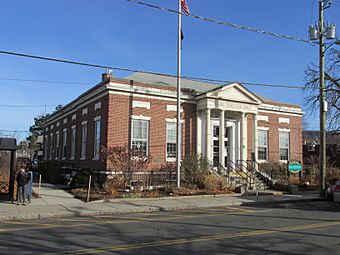United States Post Office–Easthampton Main facts for kids
Quick facts for kids |
|
|
US Post Office–Easthampton Main
|
|

US Post Office-Easthampton Main
|
|
| Location | 19 Union St., Easthampton, Massachusetts |
|---|---|
| Area | less than one acre |
| Built | 1933 |
| Architect | Simon, Louis A. |
| Architectural style | Classical Revival |
| NRHP reference No. | 86000714 |
| Added to NRHP | April 1, 1986 |
The US Post Office—Easthampton Main is a historic building in Easthampton, Massachusetts. You can find it at 19 Union Street. This building was finished in 1933. It was designed in a style called Classical Revival. This means it looks a bit like ancient Greek or Roman buildings. It's one of the most interesting buildings in the town center. In 1986, it was added to the National Register of Historic Places. This list helps protect important places. Today, it's no longer a post office. It's now a busy senior center for older people in the community.
What Does the Building Look Like?
The old Easthampton Post Office building is in the middle of Easthampton's town center. It sits at the corner of Union and High Streets. It's a one-story building made of red brick. It also has cool decorations made from light-colored limestone.
The main door is on the Union Street side. It has a fancy porch with four tall columns. These columns are in the Corinthian style, which means they have detailed tops. The porch also has a triangular roof section called a pediment. The doorway itself has a beautiful limestone frame. The windows are rectangular. They have special stone decorations above them called keystoned lintels. Inside, the lobby still has its original look. You can see marble floors and old service windows with metal screens.
Why Was This Building Built?
This building was constructed in 1933. It cost about $75,000 to buy the land and build it. We don't know the exact architect who designed it. However, it looks a lot like buildings designed by Knox Taylor. He designed many post offices earlier in the 1900s.
This post office was one of 180 built in 1933. The United States government built them as part of a special program. This program helped create jobs during the Great Depression. The Great Depression was a time when many people lost their jobs and money. Building projects like this helped people earn a living.



